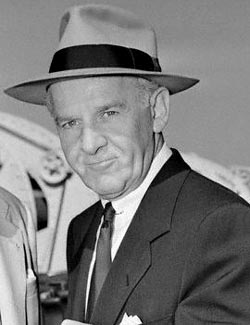They are eulogizing Al Jolson as a great entertainer … As a titan of show business, he stood alone, but he was gifted with more than superb singing artistry – he was a great man … To say that Rembrandt was a fine artist and Beethoven a fine composer merely describes the superficial qualities of their technical brilliance, Their genius stemmed from the ability to capture deep emotions and convey them to others … Expressing universal feelings which find a home in the hearts of millions is the source of their immortality … For similar reasons, Jolson is no less immortal.
Al has gone the way of all mortals, but the joy he poured into the world is a living thing.
The truth is the Jolson story does not end with his fabulous success as an entertainer. It begins there … For the Jolson saga epitomizes the American story in the grand tradition … Out of such biographies is woven the fabric of the American legend, and out of such legends is derived the inspiration for generations yet unborn.
Al reached these blessed shores as a young immigrant of penniless parents … He received much from this nation and contributed more … Yet Jolson believed he was in debt to America and never ceased paying … His gratitude for the opportunity a free nation presented was as boundless as his love for the country that made liberty a reality. Always acting like a fine American was Jolson’s finest performance. Throughout his career he refused to spare himself. He made his life as much a tribute to this country as the tribute this country is now paying him.
He was the first to entertain troops in World War Two, contracted malaria and lost a lung. Then in his upper sixties he was again the first to offer his singing gifts for bringing solace to the wounded and weary in Korea.
Today we know the exertion of his journey to Korea took a greater toll of his strength than perhaps even he realized. But he considered it his duty as an American to be there, and that was all that mattered to him. Jolson, passed away in a San Francisco hotel. Yet he was as much a battle casualty as any American soldier who has fallen on the rocky slopes of Korea … A star for more than 40 years, he earned his most glorious star rating at the end – a gold star.
It is the measure of Jolson as an American that having his name in lights on the Main Streets of America was not as thrilling to him as igniting a spark in the hearts of American soldiers battling in some far corner of the globe.The essential tenderness of the American spirit frequently results in deeper devotion to a great minstrel than a great statesman. For we know a nation is not only judged by the record of its political leaders but also by its songs … Perhaps that is because our entertainers represent as much of a national ideal as the Bill of Rights – namely the Pursuit of Happiness.
Americans are aware that statesmen and entertainers are both lighting a candle in the darkness of a tragic civilization .. . Which explains why the passing of a man who could translate the joyous national spirit into lovely melodies has drawn people into a mourning desolation cushioned with the inner satisfaction of knowing that one man’s life has been so nobly fulfilled.
He phoned me from Korea to say the reason he was rushing home was to find out if he paid our glorious country enough taxes!
The grief is profound because it is personal. Each of us feels we have lost a friend – and Al’s friend was any person acquainted with his stirring voice … Wherever Jolson is right now, we’re certain he is enjoying the world-wide salutes … Al was too much of a realist to be impressed by maudlin words, but as an honest showman he was always thrilled by mass affection. He truly loved the public that loved him. Their applause was the bread of his life, and he could play upon the heartstrings of an audience like a Stradivarius.
Jolson’s career was not all sunshine and blue skies. After tasting the fragrance of acclaim, he was temporarily numbed by the cold hand of oblivion. . . That he was able to rise to greater heights after toppling was as much a tribute to his talents as to his fighting heart … Al was a champion in the finest sense of the word. A man could scale the heights with natural gifts, but it takes the most potent moral stamina to rise again after stumbling.
His remarkable comeback was the test of Jolson as a man, and he came through with flying Technicolors.
It staggers the imagination to conceive that Jolson is dead. He was a man of vitality. His enthusiasm bubbled and gushed and flowed like a torrent. Until his final days Al’s exuberance was almost childlike in its intensity. The way he walked, the way he talked, the way he sang reflected his throbbing spirit. He loved to live and laugh and love.
Jolson’s most essential living quality was his glorious voice – and it will never be stilled. His heritage is not monetary. He left bright love songs for youth, flowing memories to older folks and a record of Americanism that will never Iose its gleam.
Yes, they are singing Jolson’s praises, but no praise is as beautiful as his singing … Another star is in the heavens. Strike up the band! Gabriel, blow your horn! Play the celestial harp … Jolson sings again, and how the angels must be applauding – for this magical troubadour is now performing on another stage. Angels, you ain’t heard nothin’ yet.
from “The Real Story of Al Jolson” 1950, Spectrolux Corp.
